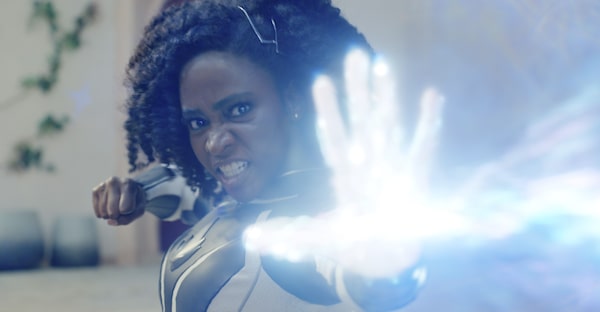
Teyonah Parris as Captain Monica Rambeau in a scene from 'The Marvels.'Laura Radford/The Associated Press
Since 2008’s Iron Man, the Marvel machine has been one of the most unstoppable forces in box-office history. Now, though, that aura of invincibility is showing signs of wear and tear. The superhero factory hit a new low with the weekend launch of The Marvels, which opened with just US$47-million, according to studio estimates Sunday.
The 33rd installment in the Marvel Cinematic Universe, a sequel to the 2019 Brie Larson-led Captain Marvel, managed less than a third of the US$153.4-million its predecessor launched with before ultimately taking in US$1.13-billion worldwide.
Sequels, especially in Marvel Land, aren’t supposed to fall off a cliff. Yet The Marvels debuted with more than US$100-million less than Captain Marvel opened with – something no sequel before has ever done. David A. Gross, who runs the movie consulting firm Franchise Research Entertainment, called it “an unprecedented Marvel box-office collapse.”
The previous low for a Walt Disney Co.-owned Marvel movie was Ant-Man, which bowed with US$57.2-million in 2015. Otherwise, you have to go outside the Disney MCU to find such a slow start for a Marvel movie – releases like Universal’s The Incredible Hulk with US$55.4-million in 2008, Sony’s Morbius with US$39-million in 2022 or 20th Century Fox’s Fantastic Four reboot with US$25.6-million in 2015.
But The Marvels was a US$200-million-plus sequel to a billion-dollar blockbuster. It was also an exceptional Marvel release in numerous ways. The film, directed by Nia DaCosta, was the first MCU release directed by a Black woman. It was also the rare Marvel movie led by three women – Larson, Teyonah Parris and Iman Vellani.
Reviews weren’t strong (62 per cent fresh on Rotten Tomatoes) and neither was audience reaction. The Marvels is only the third MCU release to receive a “B” CinemaScore from moviegoers, following Eternals and Ant-Man and the Wasp: Quantamania.
The Marvels, which added US$63.3-million in overseas ticket sales, may go down as a turning point in the MCU. Over the years, the franchise has collected US$33-billion globally – a point Disney noted in reporting its grosses Sunday.
But with movie screens and streaming platforms increasingly crowded with superhero films and series, some analysts have detected a new fatigue setting in for audiences. Disney chief executive Bob Iger himself has spoken about possible oversaturation for Marvel.
“Over the last three and a half years, the growth of the genre has stopped,” Gross wrote in a newsletter Sunday.
Either way, something is shifting for superheroes. The box-office crown this year appears assured to go to Barbie, the year’s biggest smash with more than US$1.4-billion worldwide for Warner Bros.
Marvel has still produced recent hits. Guardians of the Galaxy Vol. 3 launched this summer with US$118-million before ultimately raking in US$845.6-million worldwide. Sony’s Spider-Man: Across the Spider-Verse earned US$690.5-million globally and, after rave reviews, is widely expected to be an Oscar contender.
The actors strike also didn’t do The Marvels any favours. The cast of the film weren’t permitted to promote the film until the strike was called off late Wednesday evening when SAG-AFTRA and the studios reached agreement. Larson and company quickly jumped onto social media and made surprise appearances in theatres. And Larson guested on The Tonight Show on Friday.
The normally orderly pattern of MCU releases has also been disrupted by the strikes. After numerous strike-related delays, the only Marvel movie currently on the studio’s 2024 calendar is Deadpool 3, opening July 26.
Separately, after two weeks atop the box office, Universal Pictures’ Five Nights at Freddy’s slid to second place with US$9-million in its third weekend of release. The Blumhouse-produced video game adaptation has accumulated US$127.2-million domestically.
Taylor Swift’s The Eras Tour concert film came in third with US$5.9-million from 2,484 venues in its fifth weekend of release. The film, produced by Swift and distributed by AMC Theatres, has made US$172.5-million domestically and US$240.9-million worldwide.
Sofia Coppola’s Priscilla held strongly in its second weekend of wide release. The A24 film, starring Cailee Spaeny as Priscilla Presley and Jacob Elordi as Elvis, remained in fourth place with US$4.8-million, dipping only 5 per cent from the week prior.
Martin Scorsese’s Killers of the Flower Moon, an Apple Studios production being theatrically distributed by Paramount Pictures, took in US$4.7-million on its fourth weekend, to bring its domestic haul to about US$60-million. While quite low for a US$200-million movie, Killers of the Flower Moon is primarily an awards-season statement by Apple of its growing moviemaking ambitions.
In its first weekend of expanded release, Alexander Payne’s acclaimed The Holdovers, starring Paul Giamatti as a curmudgeonly boarding-school instructor, launched with US$3.2-million from 778 locations. The Focus Features release, an expected Oscar contender, will hope for strong legs as it plays through the fall.
Journey to Bethlehem, a release from Sony’s Christian subsidiary Affirm Films, debuted with US$2.4-million in about 2,000 locations.
Estimated ticket sales for Friday through Sunday at U.S. and Canadian theatres, according to Comscore. Final domestic figures will be released Monday.
1. The Marvels, US$47-million.
2. Five Nights at Freddys, US$9-million.
3. Taylor Swift: The Eras Tour, US$5.9-million.
4. Priscilla, US$4.8-million.
5. Killers of the Flower Moon, US$4.7-million.
6. The Holdovers, US$3.2-million.
7. Journey to Bethlehem, US$2.4-million.
8. Tiger 3, US$2.3-million.
9. Paw Patrol: The Mighty Movie, US$1.8-million.
10. Radical, US$1.8-million.